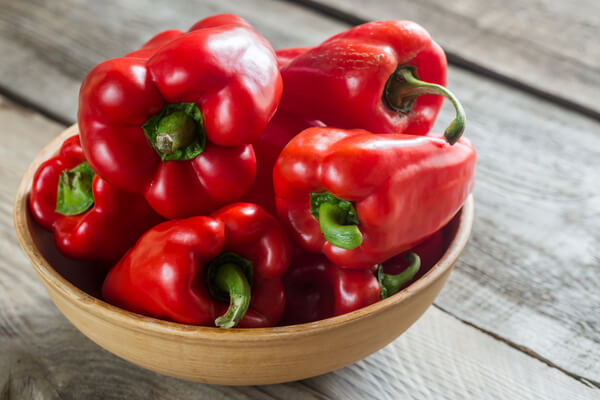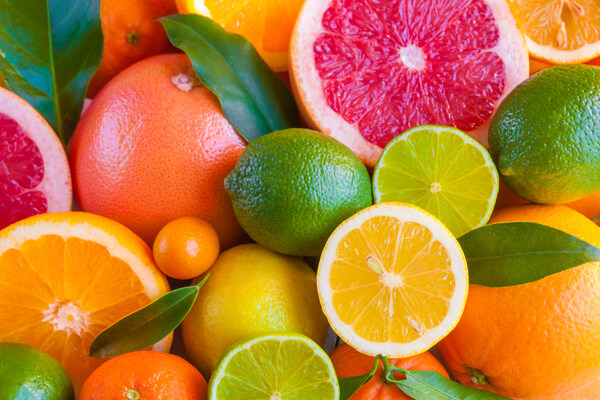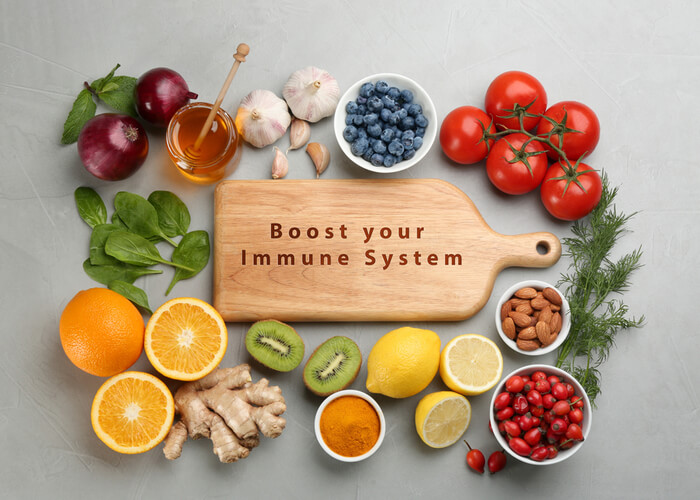You must have heard the saying, ‘An apple a day keeps the doctor away.’ This is true, but in current times and the lockdowns where you hardly get any chance to work out. Even at times, exercises only plays 20% role in your fitness. It is important to take serious measures to keep your immune system strong. Social distancing and washing your hands alone are not enough either. You need the right nutrition and foods in your body which can strengthen your immunity and help you fight against viruses and bacteria. Contrary to popular belief, immunity strengthening doesn’t need you to spend a lot of money on supplements. You can find plenty of immunity-boosting foods right in your kitchen. So, look no further and read on to find out which foods you should include in your diet!
Disclaimer: In case of doubt, please remember to consult your doctor and get it clarified. As not every suggestion is applicable, depending on your current health condition.
1.Turmeric

As everyone knows, turmeric is a key ingredient in most Indian dishes. This yellow, slightly bitter spice has been in use for generations for its anti-inflammatory properties in treating both rheumatoid arthritis and osteoarthritis. Research also shows that high amounts of curcumin, which gives turmeric its distinctive color, can decrease exercise-induced muscle damage. Curcumin is believed to be an immune booster and also antiviral. A tumbler of turmeric milk every night before bed can help you relax too. Use an insulated tumbler if you prefer your milk warm.
2. Broccoli

A lot of people detest broccoli, but that doesn’t diminish the fact that this vegetable is a powerhouse of vitamin C. It is filled with the goodness of vitamins and minerals, consisting of essential antioxidants like sulforaphane. You need to remember that it is one of the healthiest vegetables you can put on your table, keeping in mind its nutritional value of Vitamin A, C, and E as well.
3. Red Bell Peppers

Red bell peppers consist of twice as much vitamin C as citrus as they are known to be rich sources of Vitamin C. Having these in regularly can result in healthy skin, eyes, and a strong immune system. Red bell peppers have almost 3 times as much vitamin C as an orange. It also contains Beta carotene, which your body converts into vitamin A to help keep your eyes and skin healthy.
4. Spinach

Spinach might not be a very popular vegetable, but it is rich in vitamin C. It is also packed with various antioxidants and beta carotene, which increases the infection-fighting ability of your immune system. Like broccoli, spinach is perfect when it is cooked as little as possible to preserve its nutrients. However, light cooking can make it easier to absorb vitamin A, allowing other nutrients to be released from oxalic acid, an anti-nutrient.
5. Garlic

Garlic can be found in a lot of dishes in India, and rightly so with its abundant health benefits. It adds some zing to the food, and it is a must-have for good health. Early civilizations realized their value in fighting infections. According to health professionals, garlic might also help lower blood pressure and slow down the hardening of arteries. Garlic’s immune-boosting properties might have come from a heavy amount of sulfur-containing compounds like allicin.
6. Ginger

Ginger is another ingredient most people rely on during common flu or cold. Ginger has an important role in decreasing inflammation, further reducing sore throat and various inflammatory illnesses. This ingredient might also help with nausea. While it is used in plenty of sweet desserts, ginger packs some heat in the form of gingerol, a relative of capsaicin. Moreover, Ginger aids in decreasing chronic pain and might have cholesterol-lowering properties too!
7. Sunflower Seeds

Sunflower seeds are filled with nutrients, including magnesium, phosphorous, and vitamins B-6 and E. Vitamin E is essential for regulating and maintaining immune system function. Foods with high amounts of vitamin E also include avocados and dark leafy greens. Sunflower seeds are incredibly high in selenium. Just an ounce contains nearly half the selenium an average adult needs daily. A variety of studies, mostly performed on animals, believe that it has potential to combat viral infections like swine flu (H1N1).
8. Yogurt

Power-packed with Vitamin D, Yogurt can help regulate the immune system and might help boost your body’s natural defenses against diseases. Just ensure that you choose a pack of plain Yogurt as opposed to flavored ones that come with extreme amounts of sugar and artificial substances. Greek yogurt is a good choice too. You can also sweeten plain yogurt yourself with healthy fruits and a dash of honey instead. Yogurt is an excellent source of vitamin D, so try to choose brands fortified with this vitamin. Vitamin D is also responsible for regulating the immune system and is believed to boost your body’s natural defenses against diseases. Clinical trials are trying to study its possible effects on COVID-19.
9. Almonds

When it comes to fighting off or preventing colds, vitamin E is likely to take a backseat compared to vitamin C. However, this powerful antioxidant could be a key to a healthy immune system. It is a fat-soluble vitamin, requiring the presence of fat to be absorbed properly. Nuts, like almonds, are packed with the vitamin, making them healthy fats. Adults need just about 15 mg of vitamin E every day. A half-cup serving of almonds provides around 100% of the required daily amount.
10. Citrus Fruits

Most people turn straight to vitamin C right after they have caught a cold. That is because it aids in building up your immune system. Vitamin C is also believed to increase the production of white blood cells as they are the key to fighting infections. Most of the citrus fruits are rich in vitamin C. You just have to add a few drops of this vitamin to any meal with such a variety to choose from. Common citrus fruits include grapefruit, tangerines, oranges, clementines, lemons, limes, etc. As your body doesn’t produce or store it, you need to consume vitamin C daily for good health.
Conclusion
Variety is the key to a great immune system and proper nutrition. Eating only one of these foods will not be enough to fight the flu or other infections, even if you eat them constantly. You have to pay attention to serving sizes and daily recommended intake so that you do not receive too much of one vitamin and too little of others. Eating moderately is a great start, and there are other things you can do to protect your family and yourself from cold, flu, and other illnesses. These immunity-boosting foods need to be in your kitchen and your plate right now!





